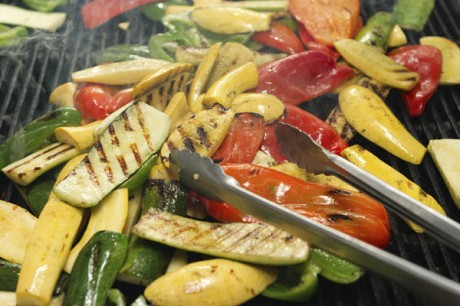How to grill meats, fruits and vegetables
Grilling offers a convenient and heart-healthy way to prepare food, if done right.

Grilling offers a convenient and heart-healthy way to prepare food, if done right. People tend to think of meat when they think of grilling, but this time of year offers an abundance of seasonal produce loaded with nutrients that tastes wonderful grilled.
Prepping fruit
Grilling fruits bring out their natural sweetness, and also softens their skins. Harder fruits such as apples and pineapples are easiest to prepare, but don't be afraid to try softer fruits such as peaches and nectarines. Also:
Pick a fresh firm fruit that's just short of being perfectly ripe.
Slice the fruit in half (you can keep the peel on) and soak it in water to maximize the amount of liquid inside so it stays moist on the grill.
If desired, add a little lemon juice to the soaking water to preserve the fruit's color. Feel free to experiment with different spices, like cinnamon or nutmeg. Adding sugar is not necessary.
Generally, you want to grill fruit over medium heat on a very clean cooking grate (although a higher temperature works best for some items such as cantaloupe).
Like fruits, most vegetables cook better and are less likely to stick if marinated first or brushed lightly with cooking oil. It may help to thread fruit or vegetables on skewers. Given the delicate nature of produce, grilling time may vary, but usually a few minutes will suffice.
Meat safety
For some, a grilled meal always includes meat. To keep it healthy, select smaller, leaner cuts and limit your portions. You also might want to try fish as an alternative to hamburgers. Salmon, trout and herring are high in heart healthy omega-3 fatty acids and hold up well on the grill. Also:
Marinate, marinate! Research suggests that even briefly marinating meat reduces the formation of cancer-causing chemicals.
Avoid flames. Grill your food on glowing embers, not high flames. If you have a gas grill, keep it on medium instead of high. When fats and juices drip down onto an open flame, it can cause a flare-up which may deposit unhealthy carcinogens onto your meat.
Use a meat thermometer. Don't let your beef, pork or lamb burgers cook above 160 degrees F; chicken breasts and hotdogs should stay around 165 degrees F, while steaks are done at 145.
Finally, flip meat frequently.
-
Share this story:


